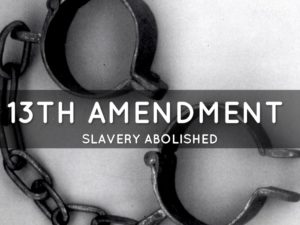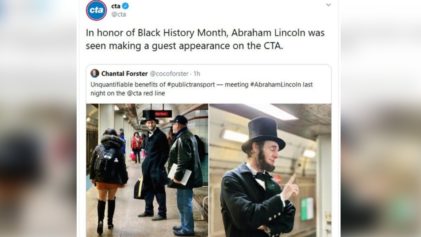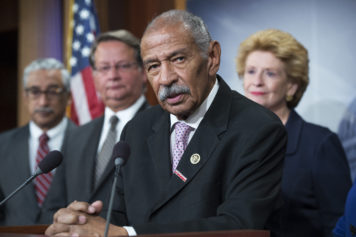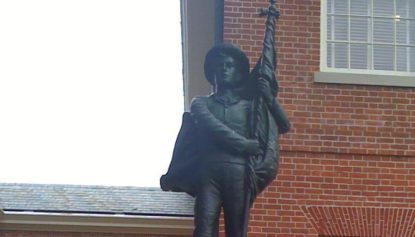
Much is said of President Lincoln’s Emancipation Proclamation, which was issued on January 1, 1863. However, as historian and Columbia University professor Eric Foner notes, this did not bring about an end to slavery.
“The proclamation was certainly the turning point of the Civil War. But Lincoln did not free the four million slaves with a stroke of his pen,” Foner wrote in the Philadelphia Inquirer. “The proclamation had no bearing on the four border slave states that remained in the Union and exempted certain areas of the Confederacy that had fallen under Union military control. All told, perhaps 800,000 slaves were not covered. Moreover, the proclamation emancipated people; it did not eradicate the state laws that established and protected slavery.”
Foner also noted that Lincoln originally did not support the amendment, but rather promoted the concept of individual states abolishing slavery. But the abolition movement and radical Republicans in Congress forced the issue. As Linda R. Monk wrote in the Huffington Post, four years before the enactment of the amendment, Lincoln supported the Corwin Amendment, a proposed Thirteenth Amendment, which read: “No amendment shall be made to the Constitution which will authorize or give to Congress the power to abolish or interfere, within any State, with the domestic institutions thereof, including that of persons held to labor or service by the laws of said State.”
The goal of the amendment, which obviously failed, was to appease the border states and attempt to stem the tide of Southern states seceding from the Union. Monk argued that even though an eventual amendment was passed that abolished slavery, we cannot ignore the past, as “a brutal system of race-based discrimination persisted for more than a century, and in many ways still continues today.”
According to Foner, society is still struggling with the notion of what kind of freedom the Thirteenth Amendment guarantees, and determining how the rights of the children of slaves should be guaranteed.
Some African-American leaders believe that in order to chart a new course for civil rights, it is time to have a formal, national recognition by the government of December 6 as Abolition Day. This includes a petition to help make that happen.
“December 6, 1865, is arguably the most significant moment in African-American history,” said Federal Judge James Wynn of the U.S. Fourth Circuit Court of Appeals. “Ours is a nation of laws, grounded in the Constitution, and it took an amendment to our core document to finally erase the blight of slavery from our laws. It isn’t often we can look to a specific date and say, ‘An evil institution ended that day.’”
According to a national survey recently conducted by Sachs Media Group, only a quarter of Americans recognize the Thirteenth Amendment as the official, legal end to slavery in the United States. Rather, 49 percent of respondents thought the Emancipation Proclamation abolished slavery by law.
“To younger Americans, the 1860s and 1960s are both pretty much the same thing – ancient history. It falls to us to make sure all Americans, including millennials, understand that each new era is in fact another step on the path to equality and freedom,” said Cornell William Brooks, President and CEO of the NAACP. “By focusing attention on the history that was made 150 years ago – by spotlighting a time when leaders directed their efforts to improving the lives of all Americans – we can help chart a course to move forward positively for the next 150 years and beyond.”
“As I travel around the country, I see examples of injustice and reminders of the inequality that still exists in our society,” said Benjamin Crump, president of the National Bar Association. “Yet I also see clear illustrations of just how far our nation has come since a time when the laws of our land allowed some men to own other human beings. It was the 13th Amendment that changed all that.”
Some have used the occasion of this anniversary of slavery abolition to apologize for the institution of slavery. On Sunday, Delaware Governor Jack Markell (D), while recognizing the anniversary of the Thirteenth Amendment, announced a resolution officially condemning and apologizing for his state’s role in slavery. Markell called the resolution a pledge “to fix the long legacy of damage that continues to result in inequality and unfair obstacles for countless citizens because of their race.”
“We must publicly and candidly acknowledge the lasting damage of past sins – damage that continues to reverberate more than 150 years after the abolition of slavery,” Markell told a congregation at the Bethel African Methodist Episcopal Church in Wilmington, Delaware, as Reuters reported.
The governor’s announcement comes a month after he issued a posthumous pardon for Samuel Burris, a free Black Delaware man who helped liberate slaves through the Underground Railroad. Delaware is one of a handful of states that has engaged in the process of apologizing for slavery.
“Who we can be tomorrow is predicated upon our ability to show empathy for each other today,” said Delaware Senate Majority Whip Margaret Rose Henry, a sponsor of the measure.
Henry noted that showing regret for the past allows us to pave the way for the future.
“An apology for slavery is just that: an act of empathy that won’t undo the past, but will once and for all acknowledge the experience of so many Delawareans who still feel its harsh effects,” she said.
To be sure, an apology is an important step on the road to righting injustices, and certainly better than ignoring the wrong and living in a state of denial. But how much does an apology really give you if it is not also followed by some meat on the bones, so to speak? What about reparations? An apology for the sins of the past, which also includes many sins continuing to this day in terms of institutional racism, racial inequities and injustices galore, must be accompanied by a wholesale effort to make amends for the damage that was and is being done.
In reality, nothing can even begin to reverse or heal all of the hurt over the centuries–the kidnappings, rape and theft, the separation of families, the forced labor, lynching, terrorism and police state conditions that Black folks have endured. Nonetheless, there is a price tag for all the pain and suffering, past and current, and the invoice must be paid now.


